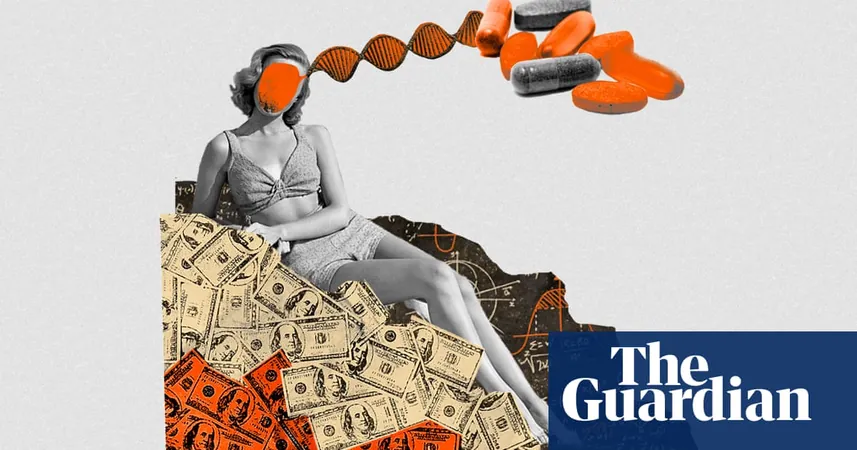
The Disturbing Resurgence of ‘Soft Eugenics’ in Modern Health Policies
2025-05-04
Author: Jacob
The Dark Origins of Eugenics
In 1883, English polymath Francis Galton introduced the concept of eugenics, inspired by animal breeding. He advocated for the propagation of individuals with 'desirable' traits while discouraging those deemed 'undesirable.' This notion fostered a flawed racial hierarchy, with white Europeans positioned at the top.
From Hard to Soft: A Tragic Evolution
Eugenics has a tragic history marked by forced sterilizations and genocides. However, the 20th century saw the emergence of 'soft eugenics'—a non-coercive approach focused on individual choices and medical guidance to mitigate certain health conditions. Nancy Stepan's 1991 book, "The Hour of Eugenics," brought attention to the way soft eugenics operates through indirect, educational methods, contrasting sharply with the direct interventions of hard eugenics.
Health and Personal Responsibility: A Dangerous Outlook
Enter Robert F. Kennedy Jr., the current secretary of health, who waxes nostalgic about a past where diseases like diabetes and autism were rare. He champions a return to 'natural' living while demonizing modern food additives and vaccines. His emphasis on personal responsibility dismisses broader socio-economic factors that impact health outcomes.
The Politics of Weakness
Kennedy’s 'Maha' (Make America Healthy Again) movement embodies a troubling philosophy. Rather than call for systemic change, it suggests that those who disregard health advice may simply have to suffer the consequences. This neglect mirrors a soft eugenics mentality, allowing the weak to fall by the wayside while advocating for those deemed 'strong' to thrive.
Misunderstanding Health and Disease
Kennedy’s approach minimizes the role of comprehensive healthcare. He emphasizes personal dietary choices over social services, suggesting that removing chemicals from food will immediately improve national health. In reality, the systemic barriers to accessing quality health and nutrition continue to thwart these claims.
The Measles Outbreak: A Case Study in Public Health Neglect
Kennedy’s response to a recent measles outbreak highlights his soft eugenic thinking. He spreads misinformation about vaccine safety while advocating for dubious alternative treatments, leading to the dangerous possibility of a resurgence in preventable diseases. His shifting stance on vaccination only complicates matters further.
Autism Misconceptions
Kennedy’s misunderstanding of autism as a 'preventable disease' capitalizes on fears and misconceptions. He dismisses the extensive research linking genetics to the condition while perpetuating the myth that environmental toxins are solely to blame.
Elon Musk and the Pronatalist Agenda
Similarly, Elon Musk’s obsession with boosting birth rates among the 'intelligent' highlights another facet of soft eugenics. His desire for 'smart' people to breed more ignores the deeper socio-economic realities contributing to declining birth rates.
Cutting Services, Not Sharing Solutions
The current administration's focus isn’t just about childbirth—it's about dismantling public health services that aid vulnerable populations. Cuts to programs essential for maternal and child health threaten millions without addressing why these populations struggle in the first place.
A Call for Inclusive Health Policies
Kennedy’s comparison of American health outcomes with other countries conveniently omits that many offer universal healthcare—a system he vehemently opposes. His perspective reinforces the belief that only those who can afford health should receive it, neglecting the inherent health risks borne by marginalized communities.
The Long Shadow of Eugenics
As we observe this modern trend of soft eugenics, we must recognize its echoes of a troubling past. It highlights a desire to return to a fictitious ideal, where only the 'fit' survive. As Adam Rutherford articulates in his book, the adoration of a better past runs deeply within the eugenics movement. Kennedy’s vision for America isn’t just about health; it’s a throwback to a mythic era that risks redefining worth based on arbitrary traits.
Conclusion: The Stakes of Public Health
In a world increasingly influenced by eugenic thinking, the discourse must shift towards holistic health solutions. Prioritizing access to healthcare and addressing systemic inequities is crucial in fostering a society that values all lives, not just those deemed 'fit.'









 Brasil (PT)
Brasil (PT)
 Canada (EN)
Canada (EN)
 Chile (ES)
Chile (ES)
 Česko (CS)
Česko (CS)
 대한민국 (KO)
대한민국 (KO)
 España (ES)
España (ES)
 France (FR)
France (FR)
 Hong Kong (EN)
Hong Kong (EN)
 Italia (IT)
Italia (IT)
 日本 (JA)
日本 (JA)
 Magyarország (HU)
Magyarország (HU)
 Norge (NO)
Norge (NO)
 Polska (PL)
Polska (PL)
 Schweiz (DE)
Schweiz (DE)
 Singapore (EN)
Singapore (EN)
 Sverige (SV)
Sverige (SV)
 Suomi (FI)
Suomi (FI)
 Türkiye (TR)
Türkiye (TR)
 الإمارات العربية المتحدة (AR)
الإمارات العربية المتحدة (AR)